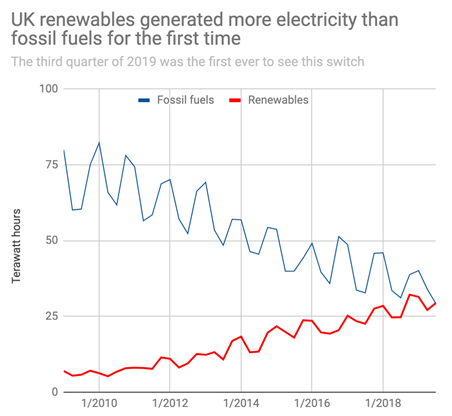UK renewables generate more electricity than fossil fuels for the first time
Energy sector has seen hydrocarbon use halve since 2010 and green sources increase more than fourfold
Your support helps us to tell the story
From reproductive rights to climate change to Big Tech, The Independent is on the ground when the story is developing. Whether it's investigating the financials of Elon Musk's pro-Trump PAC or producing our latest documentary, 'The A Word', which shines a light on the American women fighting for reproductive rights, we know how important it is to parse out the facts from the messaging.
At such a critical moment in US history, we need reporters on the ground. Your donation allows us to keep sending journalists to speak to both sides of the story.
The Independent is trusted by Americans across the entire political spectrum. And unlike many other quality news outlets, we choose not to lock Americans out of our reporting and analysis with paywalls. We believe quality journalism should be available to everyone, paid for by those who can afford it.
Your support makes all the difference.UK renewables have generated more electricity than fossil fuels for the first time, according to an analysis of energy use for the third quarter of this year.
Wind farms, solar panels, biomass and hydropower generated 29.5 terawatt hours (TWh) of energy for the months of July, August and September, compared to 29.1TWh from fossil fuels, according to Carbon Brief.
In 2010, 10 times more energy came from burning fossil fuels than renewable energy, but the cost of renewables has tumbled, with onshore wind and solar power frequently cheaper.
This marks the latest milestone in the rapid decarbonisation of the UK’s electricity system.
Dr Simon Evans, deputy editor of Carbon Brief, told The Independent: “The UK has made significant progress in cutting its CO2 emissions over the past decade.

“Almost all of that progress is thanks to the electricity sector, which as our analysis shows has seen fossil fuel generation halve since 2010 and renewables increase more than fourfold.
“Other parts of the economy have made very little progress. The UK will not be able to meet its legally-binding carbon targets in future without emissions cuts in other areas, such as heating and transport,” he said.
Out of the total of 29.1TWh from fossil fuels, 28.4TWh came from gas, 0.4TWh came from coal and 0.3TWh from oil, according to the analysis of national statistics from the Department for Business, Energy & Industrial Strategy (BEIS).
There are now just seven coal-fired power stations left in the UK, with the last one set to close by 2025.
Out of the 29.5TWh from renewable sources of energy, 14.6TWh came from wind, 8.8TWh from biomass, 4.7TWh from solar and 1.4TWh came from hydropower.
This is part of a growing trend and in the first three quarters of this year, renewables did better than fossil fuels on 103 out of 273 of the days.
However, despite huge success in the electricity sector, other parts of the economy have made little progress in reducing emissions.
Last year 6.8tns of greenhouse gases were emitted per person and by 2050 this will need to have dropped to zero.
The Committee on Climate Change’s (CCC) annual report to parliament showed UK action to slash greenhouse gas emissions driving climate change is lagging far behind what is needed.
BEIS was awarded £30m extra in the latest spending round to “accelerate progress” on decarbonisation projects next year.
However, this was just 0.1 per cent of what is required, according to Britain’s biggest environmental groups, including Greenpeace and Friends of the Earth.

Join our commenting forum
Join thought-provoking conversations, follow other Independent readers and see their replies
Comments